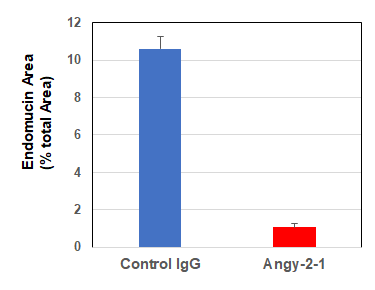anti-Angiopoietin-2 (human) mAb (rec.) (blocking) (Angy-2-1)
| Code | Size | Price |
|---|
| AG-27B-0016-C100 | 100 ug | £300.00 |
Quantity:
Prices exclude any Taxes / VAT
Overview
Antibody Clonality: Recombinant Antibody
Regulatory Status: RUO
Target Species:
- Human
- Mouse
Applications:
- Enzyme-Linked Immunosorbent Assay (ELISA)
- Functional Study
Shipping:
-20°C
Storage:
-20°C
Images
Documents
Further Information
Alternate Names/Synonyms:
Ang-2; Ang2; Angpt2; Agpt2
Concentration:
1mg/ml
EClass:
32160000
Form (Short):
liquid
Formulation:
Liquid. In PBS containing 10% glycerol and 0.02% sodium azide.
Handling Advice:
After opening, prepare aliquots and store at -20°C.Avoid freeze/thaw cycles.
Immunogen:
Recombinant human angiopoietin-2.
Long Description:
Recombinant Antibody. Recognizes human and mouse angiopoietin-2. Does not detect human angiopoietin-1. Species cross-reactivity: Human, Mouse. Clone: Angy-2-1. Isotype: Mouse IgG2blambda. Applications: ELISA, FUNC (Blocking). Host: CHO cells. Liquid. In PBS containing 10% glycerol and 0.02% sodium azide. Angiopoietin-1 (Ang-1) and Angiopoietin-2 (Ang-2) are closely related secreted ligands which bind with similar affinity to Tie-2. Tie-2 and angiopoietins have been shown to play critical roles in embryogenic angiogenesis and in maintaining the integrity of the adult vasculature. Ang-1 activates Tie-2 signaling on endothelial cells to promote chemotaxis, cell survival, cell sprouting, vessel growth and stabilization. Ang-2 has been identified as a secreted protein ligand of Tie-2 and has alternatively been reported to be an antagonist for Ang-1 induced Tie-2 signaling as well as an agonist for Tie-2 signaling, depending on the cell context. anti-Angiopoietin-2, mAb (rec.) (blocking) (Angy-2-1) is an antibody developed by antibody phage display technology using a human naive antibody gene library. These libraries consist of scFv (single chain fragment variable) composed of VH (variable domain of the human immunoglobulin heavy chain) and VL (variable domain of the human immunoglobulin light chain) connected by a polypeptide linker. The antibody fragments are displayed on the surface of filamentous bacteriophage (M13). This scFv was selected by affinity selection on antigen in a process termed panning. Multiple rounds of panning are performed to enrich for antigen-specific scFv-phage. Monoclonal antibodies are subsequently identified by screening after each round of selection. The selected monoclonal scFv is cloned into an appropriate vector containing a Fc portion of interest and then produced in mammalian cells to generate an IgG like scFv-Fc fusion protein.
NCBI, Uniprot Number:
O15123
Other data:
anti-Angiopoietin-2, mAb (rec.) (blocking) (Angy-2-1) is composed of human variable regions (VH and VL) (lambda-chain) of immunoglobulin fused to the mouse lgG2b Fc domain.
Package Type:
Plastic Vial
Product Description:
Angiopoietin-1 (Ang-1) and Angiopoietin-2 (Ang-2) are closely related secreted ligands which bind with similar affinity to Tie-2. Tie-2 and angiopoietins have been shown to play critical roles in embryogenic angiogenesis and in maintaining the integrity of the adult vasculature. Ang-1 activates Tie-2 signaling on endothelial cells to promote chemotaxis, cell survival, cell sprouting, vessel growth and stabilization. Ang-2 has been identified as a secreted protein ligand of Tie-2 and has alternatively been reported to be an antagonist for Ang-1 induced Tie-2 signaling as well as an agonist for Tie-2 signaling, depending on the cell context. anti-Angiopoietin-2, mAb (rec.) (blocking) (Angy-2-1) is an antibody developed by antibody phage display technology using a human naive antibody gene library. These libraries consist of scFv (single chain fragment variable) composed of VH (variable domain of the human immunoglobulin heavy chain) and VL (variable domain of the human immunoglobulin light chain) connected by a polypeptide linker. The antibody fragments are displayed on the surface of filamentous bacteriophage (M13). This scFv was selected by affinity selection on antigen in a process termed panning. Multiple rounds of panning are performed to enrich for antigen-specific scFv-phage. Monoclonal antibodies are subsequently identified by screening after each round of selection. The selected monoclonal scFv is cloned into an appropriate vector containing a Fc portion of interest and then produced in mammalian cells to generate an IgG like scFv-Fc fusion protein.
Purity:
>95% (SDS-PAGE)
Source / Host:
Produced without the use of animals. Purified from CHO cell culture supernatant.
Specificity:
Recognizes human and mouse angiopoietin-2. Does not detect human angiopoietin-1.
Transportation:
Non-hazardous
UNSPSC Category:
Primary Antibodies
UNSPSC Number:
12352203
Use & Stability:
Stable for at least 1 year after receipt when stored at -20°C.
References
Elevated angiopoietin-2 level in patients with continuous-flow left ventricular assist devices leads to altered angiogenesis and is associated with higher nonsurgical bleeding: C.E. Tabit, et al.; Circulation 134, 141 (2016) | Angiopoietin 2 induces astrocyte apoptosis via alphavbeta5-integrin signaling in diabetic retinopathy: J.H. Yun, et al.; Cell Death Dis. 7, e2101 (2016) | Angiopoietin-2 in white adipose tissue improves metabolic homeostasis through enhanced angiogenesis: Y.A. An, et al.; eLife 6, e24071 (2017)



